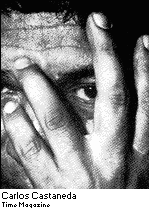![]()
I think the following exchange between Castaneda and an interviewer elegantly expresses the difference between sorcery/ hyperstition and art/ literature. Literature only becomes-sorcerous when it stops 'rearranging the glosses' and takes us out into non-ordinary reality.

CASTANEDA: I have come to understand sorcery in terms of Talcott Parsons' idea of glosses. A gloss is a total system of perception and language. For instance, this room is a gloss. We have lumped together a series of isolated perceptions--floor, ceiling, window, lights, rugs, etc.--to make a totality. But we had to be taught to put the world together in this way. A child reconnoiters the world with few preconceptions until he is taught to see things in a way that corresponds to the descriptions everybody agrees on. The world is an agreement. The system of glossing seems to be somewhat like walking. We have to learn to walk, but once we learn we are subject to the syntax of language and the mode of perception it contains.
KEEN: So sorcery, like art, teaches a new system of glossing. When, for instance, van Gogh broke with the artistic tradition and painted "The Starry Night" he was in effect saying: here is a new way of looking at things. Stars are alive and they whirl around in their energy field.
CASTANEDA: Partly. But there is a difference. An artist usually just rearranges the old glosses that are proper to his membership. Membership consists of being an expert in the innuendoes of meaning that are contained within a culture. For instance, my primary membership like most educated Western men was in the European intellectual world. You can't break out of one membership without being introduced into another. You can only rearrange the glosses.
Posted by mark k-p at July 20, 2004 12:56 AM